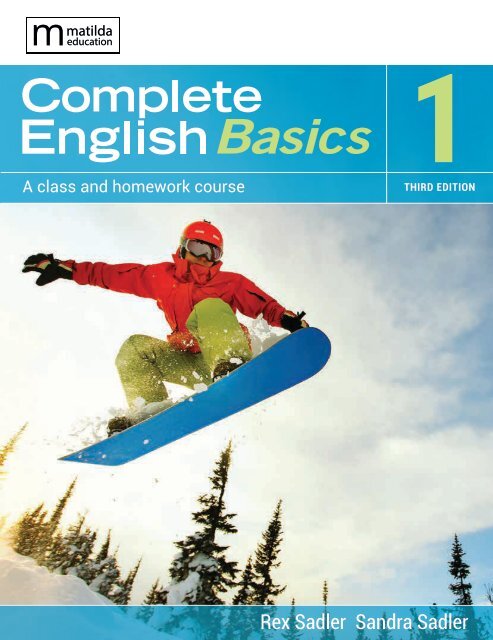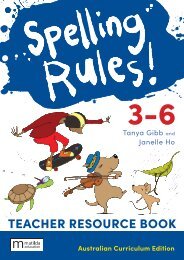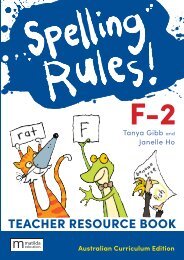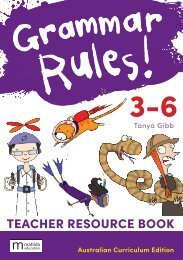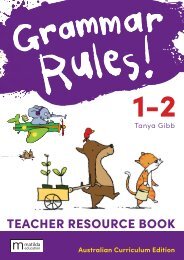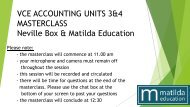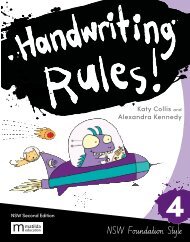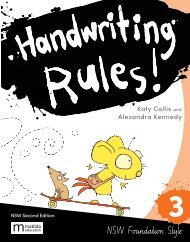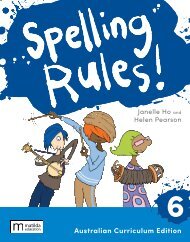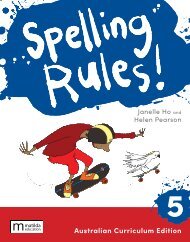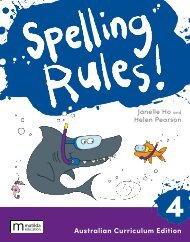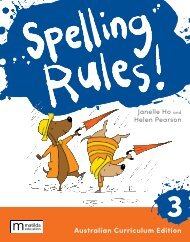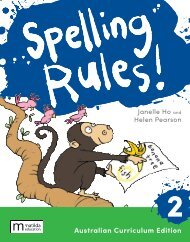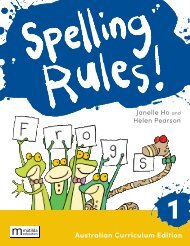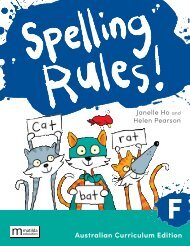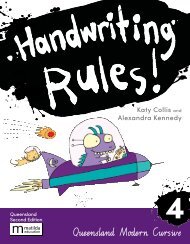Complete English Basics 1 student book sample/look inside
Create successful ePaper yourself
Turn your PDF publications into a flip-book with our unique Google optimized e-Paper software.
1<br />
A class and homework course<br />
THIRD EDITION<br />
Rex Sadler Sandra Sadler
This edition published in 2021 by<br />
Matilda Education Australia, an imprint<br />
of Meanwhile Education Pty Ltd<br />
Level 1/274 Brunswick St<br />
Fitzroy, Victoria Australia 3065<br />
T: 1300 277 235<br />
E: customersupport@matildaed.com.au<br />
www.matildaeducation.com.au<br />
First edition published in 2007 by<br />
Macmillan Science and Education Australia Pty Ltd<br />
Copyright © Rex Sadler and Sandra Sadler 2007, 2010, 2017<br />
The moral rights of the author have been asserted.<br />
All rights reserved.<br />
Except under the conditions described in the<br />
Copyright Act 1968 of Australia (the Act) and subsequent amendments,<br />
no part of this publication may be reproduced,<br />
stored in a retrieval system, or transmitted in any form or by any means,<br />
electronic, mechanical, photocopying, recording or otherwise,<br />
without the prior written permission of the copyright owner.<br />
Educational institutions copying any part of this <strong>book</strong><br />
for educational purposes under the Act must be covered by a<br />
Copyright Agency Limited (CAL) licence for educational institutions<br />
and must have given a remuneration notice to CAL.<br />
Licence restrictions must be adhered to. For details of the CAL licence, contact:<br />
Copyright Agency Limited, Level 11, 66 Goulburn Street, Sydney, NSW 2000.<br />
Telephone: (02) 9394 7600. Facsimile: (02) 9394 7601. Email: memberservices@copyright.com.au<br />
Publication data<br />
Authors: Rex Sadler and Sandra Sadler<br />
Title: <strong>Complete</strong> <strong>English</strong> <strong>Basics</strong> 1: A Class and Homework Course<br />
ISBN: 978 1 4202 3709 2<br />
Publisher: Emma Cooper<br />
Project editor: Barbara Delissen<br />
Cover and text designer: Dimitrios Frangoulis<br />
Production control: Janine Biderman<br />
Photo research and permissions clearance: Vanessa Roberts<br />
Typeset in Heuristica Regular 10.5/12pt by Dim Frangoulis<br />
Cover image: Shutterstock/Ipatov<br />
Printed in Malaysia by Vivar Printing Pdt Ltd<br />
1 2 3 4 5 6 7 25 24 23 22 21 20<br />
Warning: It is recommended that Aboriginal and Torres Strait Islander peoples exercise caution<br />
when viewing this publication as it may contain images of deceased persons.
Contents<br />
Preface<br />
Acknowledgements<br />
vii<br />
viii<br />
1 Enjoying texts 1<br />
Comprehension Film review 1<br />
Poem 3<br />
Information report 4<br />
Spelling and vocabulary Texts 6<br />
Language Sentences 7<br />
Phrases 9<br />
Punctuation Why do we use punctuation marks? 10<br />
The craft of writing Becoming a better writer 11<br />
2 Ancient times 12<br />
Comprehension Gladiators 12<br />
Spelling and vocabulary Ancient worlds 14<br />
Language Nouns 15<br />
Punctuation Starting and finishing sentences 17<br />
The craft of writing People from other times 18<br />
3 Around the world 19<br />
Comprehension Expedition to the jungles of Borneo 19<br />
Spelling and vocabulary Getaway 21<br />
Language Common and proper nouns 22<br />
Punctuation Making sense with sentences 24<br />
The craft of writing Life experiences 25<br />
4 People26<br />
Comprehension Mrs Pratchett 26<br />
Spelling and vocabulary Occupations 28<br />
Language Nouns—gender 29<br />
Punctuation Capital letters and full stops 30<br />
The craft of writing People 32<br />
5 Climb every mountain 33<br />
Comprehension Cliffhanger 33<br />
Spelling and vocabulary On the mountain 35<br />
Language Collective nouns 37<br />
Punctuation Statements and questions 38<br />
The craft of writing Overcoming adversity 39<br />
978 1 4202 3709 2<br />
iii
iv Contents<br />
978 1 4202 3709 2<br />
6 Feelings and emotions 40<br />
Comprehension What it feels like to survive a volcanic eruption 40<br />
Spelling and vocabulary That’s life! 42<br />
Language Abstract nouns 43<br />
Punctuation Types of sentences 44<br />
The craft of writing What it feels like to … 46<br />
7 Drive47<br />
Comprehension Car accident 47<br />
Spelling and vocabulary On the road 49<br />
Language Revision—nouns 51<br />
Punctuation Using capital letters for proper nouns 52<br />
The craft of writing An accident 53<br />
8 Marooned!54<br />
Comprehension The blue dolphins 54<br />
Spelling and vocabulary Survival 56<br />
Language Synonyms 58<br />
Punctuation Commas 59<br />
The craft of writing Castaway 60<br />
9 Food, glorious food! 61<br />
Comprehension The pizza 61<br />
Spelling and vocabulary Food, food, food! 63<br />
Language Antonyms 64<br />
Punctuation Apostrophes—abbreviating words 65<br />
The craft of writing Food, glorious food 67<br />
10 Cities68<br />
Comprehension A city under siege 68<br />
Spelling and vocabulary Cityscape 70<br />
Language Homonyms 71<br />
Punctuation Apostrophes—avoiding confusion 73<br />
The craft of writing Cities, towns and other places 74<br />
11 Fantasy75<br />
Comprehension The Grand High Witch 75<br />
Spelling and vocabulary The world of fantasy 77<br />
Language Adjectives 79<br />
Punctuation Apostrophes—ownership 80<br />
The craft of writing Villains 81<br />
12 Alien worlds 82<br />
Comprehension The Tripod 82<br />
Spelling and vocabulary Space mission 84<br />
Language Verbs 85<br />
Punctuation Capital letters 86<br />
The craft of writing The time machine 88
978 1 4202 3709 2 Contents<br />
v<br />
13 The animal kingdom 89<br />
Comprehension Skunks 89<br />
Spelling and vocabulary Creatures great and small 91<br />
Language Idioms 92<br />
Punctuation Uses of the comma 94<br />
The craft of writing Animal experiences 95<br />
14 Fashion96<br />
Comprehension Jeans 96<br />
Spelling and vocabulary Glitz and glamour 98<br />
Language Adverbs 100<br />
Punctuation Abbreviations 101<br />
The craft of writing Clothes and fashions 102<br />
15 Speaking personally 103<br />
Comprehension Chased by a boar 103<br />
Spelling and vocabulary Describing people 105<br />
Language Word families 107<br />
Punctuation Paragraphs 108<br />
The craft of writing Eyewitness accounts 109<br />
16 The long arm of the law 110<br />
Comprehension The worst bank robbers 110<br />
The noisiest burglar 111<br />
Spelling and vocabulary Law and order 112<br />
Language Prefixes 113<br />
Punctuation Quotation marks for speech 115<br />
The craft of writing A crime scene 116<br />
17 The world of computers 117<br />
Comprehension Space demons 117<br />
Spelling and vocabulary Computers 119<br />
Language Suffixes 120<br />
Punctuation More about quotation marks 121<br />
The craft of writing Inventions 123<br />
18 House and home 124<br />
Comprehension Bilbo Baggins’s house and home 124<br />
Spelling and vocabulary Home, sweet home 126<br />
Language Making comparisons using similes 127<br />
Punctuation Direct and indirect speech 129<br />
The craft of writing Houses and homes 130<br />
19 Wildfire131<br />
Comprehension Firestorm 131<br />
Spelling and vocabulary Fire 133<br />
Language Making comparisons—similes and metaphors 134<br />
Punctuation Using quotation marks for titles 136<br />
The craft of writing Disaster 137
vi Contents<br />
978 1 4202 3709 2<br />
20 Family and friends 138<br />
Comprehension A friend in need 138<br />
Spelling and vocabulary Family and friends 140<br />
Language Using better words 141<br />
Punctuation Punctuating lists 143<br />
The craft of writing Family and friends 144<br />
21 Sun, surf and sand 145<br />
Comprehension A shark tried to eat me 145<br />
Spelling and vocabulary The beach 147<br />
Language Shades of meaning 148<br />
Punctuation Revision—punctuating sentences 149<br />
The craft of writing The sea 150<br />
22 Just in time 151<br />
Comprehension The land that time forgot 151<br />
Spelling and vocabulary Words in time 153<br />
Language Prefixes and suffixes 154<br />
Punctuation Revision—sentences 155<br />
The craft of writing Long, long ago 156<br />
Back-of-the-<strong>book</strong> dictionary 157
Preface<br />
<strong>Complete</strong> <strong>English</strong> <strong>Basics</strong> 1 sets out to present essential <strong>English</strong> skills in an interesting and<br />
meaningful way for junior secondary <strong>student</strong>s.<br />
This third edition covers essential language and literacy skills underpinning the Australian<br />
Curriculum. It incorporates a wide range of comprehension texts, spelling and vocabulary<br />
development, as well as language work on sentences, phrases, parts of speech, word families<br />
and paragraphing. It is important to note that 22 creative writing tasks—linked to the ideas and<br />
techniques contained in the Literature section—have now been added.<br />
The work<strong>book</strong> can be used as a class or homework text. One approach would be to have<br />
<strong>student</strong>s complete each unit over a two-week period.<br />
The stimulus materials and exercises are designed to improve comprehension and<br />
vocabulary skills as well as language usage and spelling. A special feature is the back-of-the-<strong>book</strong><br />
dictionary, which encourages <strong>student</strong>s to expand their vocabulary by <strong>look</strong>ing up the meanings of<br />
unfamiliar words.<br />
Correct spelling is essential for good communication. Research has shown that in those<br />
classrooms where teachers are concerned about correct spelling and vocabulary enrichment,<br />
the <strong>student</strong>s’ spelling level improves significantly. It is a good idea, if time allows, to have a brief<br />
spelling test at the end of each unit using the words from the spelling and vocabulary list.<br />
The extracts are engaging and cover a diverse range of topics—from shark attacks to<br />
gladiators. A range of genres is represented, including biography, crime, fiction and adventure.<br />
Above all, we hope that <strong>student</strong>s will enjoy their <strong>English</strong> studies as they gain basic <strong>English</strong><br />
skills.<br />
Rex and Sandra Sadler<br />
978 1 4202 3709 2<br />
vii
Acknowledgements<br />
The author and publisher are grateful to the following for permission to reproduce copyright material:<br />
Photographs<br />
Alamy/A.F. ARCHIVE, 60, 102, /cbstockfoto, 4, /Pictorial Press,<br />
116; Getty Images, 56, /Jetta Productions, 3, /Popperfoto,<br />
109; iStockphoto.com/AlexRaths, 32, /Joel Carillet, 39, /<br />
CoreyFord, 156, /Derek Dammann, 19, /DarthArt, 133, /<br />
demaerre, 119, /Jacques van Dinteren, 54, /Emilie Duchesne,<br />
67, /duncan1890, 74, /marta maria fontana, 96, /Georgijevic,<br />
70, /Global_Pics, 145, /Karim Hesham, 14, /Imgorthand, 18,<br />
/Kenishirotie, 123, /Iryna Kurhan, 75, /Catherine Lane, 98,<br />
/Tina Lorien, 68, /Franklin Lugenbeel, 47, /Lysogor, 137, /<br />
mandygodbehear, 82, /Mike Morley, 138, /Karen Mower, 53,<br />
/Barış Muratoğlu, 153, /OJO_Images, 140, /Onfokus, 112, /<br />
photocritical, 117, /RapidEye, 26, / John Sommer, 42, / Dieter<br />
Spears, 84, / tirc83, 110, /Rex_Wholster, 77, /XiXinXing, 126;<br />
THE KOBAL COLLECTION/DREAMWORKS/UNIVERSAL/<br />
BUITENDIJK, JAAP, 12; Shutterstock/ Algol, 88, /Big Pants<br />
Production, 89, // DM7, 151, /Alex Hinds, 15, /Brent Hofacker,<br />
61, / JAZZDOG, 124, /K Jensen, 25, /Iakov Kalinin, 21, 147, /<br />
Elena Kalistratova, 40, /Kencana Studio, 49, /Longjourneys,<br />
46, /Lucky Business, 63, /mervas, 11, /NarongchaiHlaw, 105, /<br />
Sean Pavone, 130, 131, /Dasha Petrenko, 95, /Pressmaster, 28,<br />
/sivanadar, 91, /Vixit, 33, 35.<br />
Other material<br />
Extract from The Zoo Expeditions by David Attenborough,<br />
Penguin UK, p191, © David Attenborough Productions<br />
Ltd 1980, reproduced with permission of The Lutterworth<br />
Press, 20; Account of Titanic sinking by George Brayton, 109;<br />
Excerpt from Adrift by Steve Callahan. Copyright © 1986<br />
by Steven Callahan. Reprinted by permission of Houghton<br />
Mifflin Harcourt Publishing Company. All rights reserved, 150;<br />
Extract from The Boy Who Was Afraid by Armstrong Sperry,<br />
Heinemann Educational Publishers, 1969, 8; Cover of Adrift<br />
by Steve Callahan. Copyright © 1986 by Steven Callahan.<br />
Reprinted by permission of Houghton Mifflin Harcourt<br />
Publishing Company. All rights reserved, 150; Extract from<br />
Firestorm! by Roger Vaughan Carr, Thomas Nelson Australia,<br />
reproduced with permission by Penguin Group (Australia)<br />
and Roger Vaughan Carr, 131–2; Extract from The Witches<br />
by Roald Dahl, Jonathan Cape Ltd. & Penguin Books Ltd, ©<br />
Roald Dahl, reproduced with permission of David Higham<br />
Associates, 75-6; Extract from Boy by Roald Dahl, Puffin Books,<br />
UK, © Roald Dahl 1984, reproduced with permission of David<br />
Higham Associates, 26; 47–8; Extract from The Story Makers:<br />
A collection of interviews with Australian and New Zealand<br />
Authors and Illustrators for Young People, edited by Margaret<br />
Dunkle. Oxford University Press, 1987, 11; Extract and cover<br />
from A Fortunate Life by AB Facey, Puffin, 1985, Reproduced<br />
with permission by Penguin Group (Australia), 103–4; Extract<br />
from Fear No Boundary by Lincoln Hall and Sue Fear, Hachette<br />
Australia, 2005, 33; Extract from Collision Course by Nigel<br />
Hinton, Oxford University Press, 1976, 53; Extract from Boy<br />
Overboard by Morris Gleitzman, Puffin, 2002, 39; Extract from<br />
The Rocks of Honey by Patricia Wrightson, Puffin, 1960, 8;<br />
Extract from What it feels like ... by AJ Jacobs, HarperCollins,<br />
UK, © Esquire Magazine (US) 2003, reprinted by permission<br />
of HarperCollins Publishers Ltd, 40; Extract from I Can Jump<br />
Puddles by Alan Marshall, Longman Cheshire, 1955, reprinted<br />
by permission of Penguin Group Australia Ltd, 138–7; Extracts,<br />
The Book of Heroic Failures by Stephen Pile, © 1979 Stephen<br />
Pile. Reproduced by permission of the author c/o Rogers,<br />
Coleridge & White Ltd, 20 Powis Mews, London W11 1JN, 110,<br />
111; Extract from Zlata’s Diary: A Child’s Life in Sarajevo by<br />
Zlata Filipovic, translated by Christina Pribichevich-Zoric,<br />
Viking 1994, first published in France as ‘Le Journal de Zlata’<br />
by Fixot et editions Robert Laffont 1993, © Fixot et editions<br />
Robert Laffont 1993, reproduced by permission of Penguin<br />
Books Ltd, 68–9; Extract from Space Demons by Gillian<br />
Rubenstein. © Gillian Rubenstein, 1986. First published by<br />
Omnibus Books, a division of Scholastic Australia, 1986.<br />
Reproduced with permission of Scholastic Australia Pty<br />
Limited, 117–18; Extract from Cannery Row by John Steinbeck,<br />
Viking Press, 1945, 8; Extract from The Light beyond the Forest<br />
by Rosemary Sutcliff, The Bodley Head, 1979, 74; ‘How to<br />
Train Your Dragon 3D’ by Andrew L Urban, The Sun-Herald,<br />
23 March 2010 (Based on the original review published on<br />
www.urbancinefile.com.au, March 23, 2010), 1; Quote from<br />
Rosemary Sutcliff, 74; Extract from Blue Fin by Colin Thiele,<br />
HarperCollins, 1974, 7; Extract from February Dragon by Colin<br />
Thiele, HarperCollins 1965, 7; Extract from Blueback by Tim<br />
Winton, Pan Macmillan Australia, 1987, 46; Book cover of<br />
Lockie Leonard by Tim Winton, Penguin Books Australia, 2007,<br />
144; Extract from Lockie Leonard Human Torpedo by Tim<br />
Winton, Jenny Darling and Associates, 144; Extract from Time<br />
and Tide by Tim Winton, 25.<br />
The author and publisher would like to acknowledge the<br />
following:<br />
‘Our new teacher’ by David Bateson, 3; Extract from The<br />
White Mountains by John Christopher, Penguin Books Ltd,<br />
reproduced with permission of John Christopher, 82-3;<br />
Extract, ‘A shark tried to eat me’ by Brian Rodger in Shark<br />
Hunters by Ben Cropp, Rigby Ltd, 1964, 145. Extract from<br />
Island of the Blue Dolphins by Scott O’Dell, Copyright © 1960<br />
by Scott O’Dell, renewed 1988 by Scott O’Dell, reprinted with<br />
permission of McIntosh & Otis, Inc, 54–5; Extract from The<br />
Hobbit by JRR Tolkien, Harper Collins, 1937, 81, 124–5.<br />
While every care has been taken to trace and acknowledge<br />
copyright, the publisher tenders their apologies for any<br />
accidental infringement where copyright has proved<br />
untraceable. They would be pleased to come to a suitable<br />
arrangement with the rightful owner in each case.<br />
viii 978 1 4202 3709 2
Enjoying texts<br />
1<br />
Comprehension<br />
Read the following texts and answer the questions for each one.<br />
Film review<br />
How to Train Your Dragon 3D<br />
CRITICS RATING 8/10<br />
Rated PG<br />
WHAT if your dad was the strong, not-so-silent<br />
type, the leader of the Viking tribe, going about<br />
his daily business of slaying dragons ... and you<br />
were a spindly-legged weakling teenager?<br />
You’d probably feel like Hiccup (voiced by Jay<br />
Baruchel), a spindly-legged weakling teenager<br />
who doesn’t fit his family’s long line of dragon<br />
slayers in the land of Berk. It’s a constant source<br />
of shame for his father, Stoick (voiced by Gerard<br />
Butler), a big, burly Viking (with a big Scottish<br />
burr).<br />
But when Hiccup comes face to snout with<br />
one of the most feared of the dragons, he<br />
inadvertently discovers a more positive and<br />
powerful way of dealing with the Viking’s ‘dragon<br />
problem’ than using a sword or a sledgehammer<br />
and goes on to change the lives of his entire<br />
tribe—and that of the dragons. That’s the<br />
essential moral of the story, that problems can be<br />
solved without violence. Not a bad message. The<br />
film also covers the father–son relationship with<br />
an equally positive message.<br />
Talk to the animals …<br />
Viking teenager Hiccup befriends<br />
Toothless the dragon<br />
Magnificent 3D animation brings this family<br />
movie to life. The screenplay is smart, funny and<br />
has something to say. But perhaps the target<br />
audience of 10- to 14-year-olds will be even more<br />
impressed with the spectacular flying sequences,<br />
with Hiccup riding bareback through the air—or<br />
the mass fly-past by a dozen different types of<br />
dragons.<br />
The production elements all contribute to the<br />
immersive experience of an adventure in which<br />
humour plays a key role and the main characters<br />
quickly become familiar and real.<br />
There is a hint of romance as Hiccup and the<br />
feisty Astrid (voiced by Ferrera) find common<br />
ground and the charmingly fearsome, felineinspired<br />
dragon, Toothless, makes an indelible<br />
impression.<br />
The screenplay is based on Cressida Cowell’s<br />
popular <strong>book</strong>, which could become as hot as a<br />
dragon’s breath.<br />
Andrew L Urban<br />
978 1 4202 3709 2<br />
1
2 <strong>Complete</strong> <strong>English</strong> <strong>Basics</strong> 1<br />
978 1 4202 3709 2<br />
Reading for understanding<br />
1 How do you know from the first paragraph that the movie is a fantasy?<br />
2 What evidence can you find in the first paragraph to show that Hiccup is not a character<br />
you would expect to be the hero?<br />
3 In what ways is Hiccup’s father different to him?<br />
4 Where do Hiccup and his father live?<br />
5 What is the essential moral of the story?<br />
6 Give an example of an equally positive message in the film.<br />
7 Who, according to the reviewer, is the target audience of the film?<br />
8 What flying sequences did the reviewer feel would be likely to impress younger viewers?<br />
9 Identify the reviewer’s simile that predicts an increase in popularity of the <strong>book</strong> on<br />
which the film is based.<br />
10 Using the back-of-the-<strong>book</strong> dictionary, give the meaning of:<br />
a burr:<br />
b inadvertently:<br />
c fearsome:<br />
d feline:<br />
e indelible:<br />
10 marks
978 1 4202 3709 2<br />
1 Enjoying texts 3<br />
Poem<br />
Our new teacher<br />
This teacher has such scary teeth,<br />
they <strong>look</strong> just like a shark’s;<br />
His eyes gleam in the sunlight<br />
like a pair of purple sparks.<br />
His voice is just as booming<br />
as the roar from some big gun;<br />
He can imitate a thunderstorm<br />
for a gruesome bit of fun.<br />
And now Billy who was silly<br />
almost every other day<br />
Does his tables, writes his spellings,<br />
hides his comic <strong>book</strong> away.<br />
Every lesson lasts a lifetime ...<br />
with our noses to each page,<br />
We imagine bars on windows<br />
and the classroom seems a cage.<br />
So, please come back, Miss Fothergill:<br />
though you won’t believe it’s true,<br />
We all loved you as our teacher;<br />
we were oh, so fond of you!<br />
David Bateson<br />
Reading for understanding<br />
1 Who seems to be the narrator of this poem?<br />
2 What does the simile ‘like a shark’s’ suggest about the new teacher’s teeth?<br />
3 Identify the simile that describes the gleaming of the new teacher’s eyes.<br />
4 What is the sound of the new teacher’s voice similar to?<br />
5 How has Billy’s behaviour changed?<br />
6 Explain the meaning of ‘with our noses to each page’.<br />
7 Why do you think the narrator says, ‘We imagine bars on windows’?
4 <strong>Complete</strong> <strong>English</strong> <strong>Basics</strong> 1<br />
978 1 4202 3709 2<br />
8 What is the narrator’s plea in the final stanza?<br />
9 What contrast do you think there would be between Miss Fothergill and the new<br />
teacher?<br />
10 Write down words that rhyme with each of the following:<br />
a<br />
b<br />
c<br />
shark’s<br />
page<br />
true<br />
10 marks<br />
Information report<br />
The taipan—the world’s deadliest snake<br />
AUSTRALIA is home to two different types of<br />
taipan—the inland taipan and the coastal taipan.<br />
The inland taipan (Oxyuranus microlepidotus),<br />
which grows up to 2.5 m, produces the deadliest<br />
venom of any snake in the world, but luckily<br />
it only lives in the deserts of central eastern<br />
Australia, where few humans visit. No human<br />
deaths caused by the inland taipan have been<br />
recorded, because an effective antivenom has<br />
been produced.<br />
Inland taipans live in deep cracks in the soil<br />
to escape the extreme heat of summer. During<br />
summer their scales are a light straw colour to<br />
reflect the heat, whereas in winter their scales<br />
change to a dark brown in order to absorb the<br />
sun’s rays.<br />
The inland taipan’s favourite food is native<br />
rats. When the rats are plentiful, the population<br />
of the snakes rises dramatically—female taipans<br />
lay between 12 and 20 eggs in the soil or in<br />
abandoned animal burrows. In extremely dry<br />
years, however, the rat population decreases<br />
through starvation, so there is little food for the<br />
snakes and their death rate rises.<br />
The longest recorded coastal taipan was<br />
3.35 m. Coastal taipans (Oxyuranus scutellatus)<br />
live in northern Queensland and in the Northern<br />
Territory. They are often seen in sugar-growing<br />
areas and on grassy sand dunes. Their favourite<br />
foods are small, warm-blooded mammals such as<br />
rats, lizards, quolls and bandicoots.<br />
Coastal taipans are very aggressive and<br />
Coastal taipan<br />
have large fangs through which they inject a<br />
very potent venom. The venom is capable of<br />
paralysing small marsupials in a very short time.<br />
One strike could potentially deliver enough toxin<br />
to kill several humans. Coastal taipans have been<br />
responsible for many human deaths. The toxins<br />
in the venom cause communication between the<br />
body’s muscles and the brain to shut down. Once<br />
bitten, the taipan’s prey convulses and suffers<br />
from internal bleeding and the taipan waits for its<br />
prey to die before devouring it.
978 1 4202 3709 2<br />
1 Enjoying texts 5<br />
Reading for understanding<br />
1 ‘No human deaths caused by the inland taipan have been recorded.’ Why?<br />
2 Which type of taipan is the longer?<br />
3 How does the inland taipan escape from the extreme heat of summer?<br />
4 What is the reason for the difference in the colour of the inland taipan’s scales between<br />
summer and winter?<br />
5 What causes the death rate of the inland taipan to rise?<br />
6 Why is the coastal taipan more likely to kill a human than the inland taipan?<br />
7 What are the coastal taipan’s favourite foods?<br />
8 Why is the taipan’s bite extremely dangerous for humans?<br />
9 What effect does the toxin in the taipan’s venom have on an animal’s nervous system?<br />
10 Using the back-of-the-<strong>book</strong> dictionary, write down the meaning of these words:<br />
a dunes:<br />
b potent:<br />
c toxin:<br />
10 marks
6 <strong>Complete</strong> <strong>English</strong> <strong>Basics</strong> 1<br />
978 1 4202 3709 2<br />
Spelling and vocabulary<br />
Texts<br />
Spelling tests can be created<br />
from the word list in each unit.<br />
myth documentary advertisement poem magazine<br />
legend autobiography interview ballad newspaper<br />
recipe cartoon fantasy novel epitaph<br />
drama narrative fiction symbol menu<br />
comedy tragedy letter haiku atlas<br />
diary speech dictionary elegy biography<br />
What text am I?<br />
Use the following clues to identify the texts from the list.<br />
1 I enable people to read the news each day<br />
2 I give people the meanings and spellings of words<br />
3 I am a <strong>book</strong> of maps<br />
4 I am a list of dishes served in a restaurant<br />
5 I am a funny drawing or animated film<br />
6 I am a three-line poem of 17 syllables<br />
7 I am a story of a person’s life written by somebody else<br />
8 I am a simple poem with short verses that tells a story<br />
9 I am the words written on a tombstone<br />
10 I am a list of ingredients in cooking instructions<br />
11 I am a written message often sent by post<br />
12 I am a record of daily happenings<br />
13 I am a notice about something for sale<br />
14 I am a story about imaginary worlds and creatures<br />
15 I am a meeting in which someone is asked questions<br />
16 I am a mournful poem ending in ‘y’<br />
16 marks<br />
Word skills<br />
1 Write down the following words in alphabetical order.<br />
haiku newspaper fantasy fiction documentary letter dictionary
978 1 4202 3709 2<br />
1 Enjoying texts 7<br />
2 By adding the suffixes –ist or –er, write down the name of the person derived from each<br />
of these words:<br />
a diary c interview<br />
b novel d biography<br />
Back-of-the-<strong>book</strong> dictionary<br />
The word ‘advertisement’ is derived from the Latin words ad and verto.<br />
Ad means ‘towards’ and verto (versus) means ‘I turn’. The advertiser sets<br />
out to sell a particular product by ‘turning’ the desire of the audience<br />
‘towards’ it. Use the back-of-the-<strong>book</strong> dictionary to write down the<br />
meanings of the following words derived from verto.<br />
5 marks<br />
divert:<br />
reverse:<br />
vertigo:<br />
convert:<br />
invert:<br />
<br />
<br />
<br />
<br />
<br />
5 marks<br />
Language<br />
Sentences<br />
A sentence is a group of words that makes complete sense by itself. A sentence is usually made up<br />
of two parts. The part that tells us who or what does the action is called the subject. The number<br />
of words in the subject varies. The subject can be a noun or pronoun or a group of words. The rest<br />
of the sentence is called the predicate. The predicate always includes the verb. The subject in the<br />
following sentences is in italics. The remainder in normal type is the predicate.<br />
Gigantic updrafts and downdrafts of air swept through the vortex above them.<br />
from Blue Fin by Colin Thiele<br />
The whole crest of the slope above them suddenly boiled over with flame.<br />
from February Dragon by Colin Thiele<br />
Identifying the subject and predicate<br />
To find the subject of a sentence, ask ‘Who?’ or ‘What?’ before the verb. Write down the subjects<br />
of these well-crafted sentences.<br />
1 A great column of water rose up out of the sea. (from Blue Fin by Colin Thiele)<br />
Subject:<br />
Predicate:
8 <strong>Complete</strong> <strong>English</strong> <strong>Basics</strong> 1<br />
978 1 4202 3709 2<br />
2 Hundreds of tons of water seemed to crash down on the ship. (from Blue Fin by Colin<br />
Thiele)<br />
Subject:<br />
Predicate:<br />
3 A burst of lightning lit up the sea with supernatural brilliance. (from The Boy Who Was<br />
Afraid by Armstrong Sperry)<br />
Subject:<br />
Predicate:<br />
4 An instantaneous crack of thunder shattered the world. (from The Boy Who Was Afraid<br />
by Armstrong Sperry)<br />
Subject:<br />
Predicate:<br />
5 The anemones expand like soft and brilliant flowers. (from Cannery Row by John<br />
Steinbeck)<br />
Subject:<br />
Predicate:<br />
6 The greenish purple cloud was looming heavily over and along the opposite hills. (from<br />
The Rocks of Honey by Patricia Wrightson)<br />
Subject:<br />
Predicate:<br />
12 marks<br />
Missing subjects<br />
<strong>Complete</strong> the following sentences by adding a subject from the box.<br />
Tokyo Joan of Arc The Nile Ned Kelly<br />
Michelangelo Harry Potter Shakespeare Greenland<br />
Mt Everest The Pacific Mercedes Alfred Nobel<br />
1 is the least densely populated country in the world.<br />
2 wrote the tragedy Romeo and Juliet.<br />
3 painted the ceiling of the Sistine Chapel.<br />
4 is a famous character in a series of novels.<br />
5 is a very high mountain.<br />
6 was an Australian bushranger.<br />
7 is the world’s largest ocean.<br />
8 is the longest river in the world.<br />
9 invented dynamite in 1866.<br />
10 is a French heroine.<br />
11 is the make of a famous car.<br />
12 is the capital city of Japan.<br />
12 marks
978 1 4202 3709 2<br />
1 Enjoying texts 9<br />
Phrases<br />
A phrase is a group of words that does not make sense on its own. Unlike a sentence, a phrase does<br />
not have a finite (or complete) verb.<br />
at the zoo an elephant in the shower flying dragons<br />
Identifying sentences and phrases<br />
Write the word ‘phrase’ or ‘sentence’ next to each of the following examples.<br />
1 At midday 7 She visited the zoo<br />
2 By the river 8 Going away<br />
3 He watched the movie 9 I‘ve been to school<br />
4 They went home 10 A few days ago<br />
5 I love cooking 11 Over the rainbow<br />
6 Inside the cave 12 The computer crashed<br />
12 marks<br />
Completing phrases<br />
<strong>Complete</strong> each of the following phrases by inserting the name of the missing object.<br />
e.g. the pendulum of a<br />
the pendulum of a clock<br />
1 the radius of a 6 the yolk of an<br />
2 the spokes of a 7 the lens of a<br />
3 the fuselage of an 8 the kernel of a<br />
4 the rungs of a 9 the summit of a<br />
5 the hilt of a 10 the chapter of a<br />
10 marks<br />
Missing phrases<br />
Phrases often give sentences greater vitality. In the following passage, Obie has fallen head over<br />
heels in love with Laurie. The writer uses both phrases and sentences to communicate Obie’s<br />
feelings. Correctly insert the phrases from the box that are missing from the passage.<br />
in a rosy haze in love in the movies at the sight of her into the earth on his face<br />
Obie in love<br />
Obie was<br />
. Wildly, improbably and wonderfully in love. The kind of thing he thought<br />
happened only<br />
. Her name was Laurie Gundarson and she was beautiful.<br />
Obie’s legs dissolved<br />
, and he felt as though he would sink<br />
and disappear. He had never known such happiness or such sweet torture. He<br />
lived his days and nights<br />
and went around with a stunned and radiant<br />
expression .<br />
from Beyond the Chocolate War by Robert Cormier<br />
6 marks
10 <strong>Complete</strong> <strong>English</strong> <strong>Basics</strong> 1<br />
978 1 4202 3709 2<br />
Punctuation<br />
Why do we use punctuation marks?<br />
When we are speaking, we naturally stop at the end of a sentence. We also use pauses to help our<br />
listeners follow our meaning. We can even indicate a question or exclamation by changing the<br />
pitch of our voice.<br />
In our writing, we use punctuation marks to indicate these pauses and changes of expression.<br />
Can you imagine how confusing it would be to read and write without punctuation? The purpose<br />
of punctuation marks is to clarify written language. It is possible for one punctuation mark to<br />
alter the whole meaning of a sentence. Look at the difference a mere comma makes in these two<br />
sentences:<br />
Let’s eat Grandma!<br />
Let’s eat, Grandma!<br />
Using punctuation to change the meaning<br />
Rewrite the following sentences, changing the punctuation in each sentence to produce a more<br />
accurate meaning. Hints are given in brackets.<br />
1 Has the doctor rung Elizabeth? (Add a comma.)<br />
2 Have you eaten Father? (Add a comma.)<br />
3 The visitors ate ice-cream cheese chocolate pizza and meat pies. (Insert three<br />
commas.)<br />
4 The huskies, having eaten the explorers, moved on. (Remove the two existing commas<br />
and add a new comma.)<br />
5 Caesar entered on his head<br />
A helmet on each foot<br />
A sandal in his hand he had<br />
His trusty sword to boot.<br />
(Add full stops and capital letters.)<br />
6 Emily gets enjoyment from cooking her family and her dog. (Add a comma.)<br />
7 The amazing giant panda eats, shoots and leaves. (Remove comma.)<br />
7 marks
978 1 4202 3709 2<br />
1 Enjoying texts 11<br />
The craft of writing<br />
Becoming a better writer<br />
From time to time, successful writers give practical<br />
advice on what techniques have helped them in their<br />
writing careers. Here is a very important hint from author<br />
Christobel Mattingley:<br />
When you write about something you know, the words<br />
come more easily. It may be real—a place, a person or a<br />
happening. Or it may be something in your own mind,<br />
that you’ve made up. It has to be so real to you that your<br />
words make it live for other people. Then it is true to<br />
itself. And you are true to yourself.<br />
Here is an opportunity to write about something you know. Write 200 words on one of the<br />
following:<br />
• Recount some of your earliest childhood memories. Begin ‘I remember when …’<br />
• Describe your first days at high school.<br />
• Write a description titled ‘My bedroom’.
2 Ancient times<br />
Comprehension<br />
Read the following passage and answer the questions that follow.<br />
Gladiators<br />
ROMAN gladiators were typically<br />
slaves, prisoners of war or convicted<br />
criminals. There were differ ent types<br />
of gladiators. As the Roman Empire<br />
expanded, many of the prisoners<br />
of war who became gladiators wore<br />
the clothes and weapons associated<br />
with their conquered country. For<br />
example, Samnites carried oblong<br />
shields and short swords and<br />
wore plumed helmets with visors.<br />
Thracians used small, round shields<br />
and fought with curved daggers.<br />
The ‘net men’ carried large nets to<br />
entwine their opponent and then<br />
killed them with a trident, a threepronged<br />
weapon.<br />
Some gladiators, called bestiarii,<br />
were trained to fight wild animals.<br />
The number of animals killed in any<br />
one day was astonishing. During the<br />
special games, which Trajan held<br />
when he became Emperor, 9000<br />
animals were slaughtered.<br />
Strangely enough, a number of free citizens<br />
chose to become gladiators and to renounce<br />
their rights as citizens. These were mainly poorer<br />
people who chose this life because gladiators, on<br />
the whole, were well fed and were given proper<br />
medical care. Even members of higher social<br />
status sometimes chose to enter a gladiator<br />
school if their family had financial problems.<br />
Most owners and trainers regarded their<br />
gladiators as an investment and ensured they<br />
were well <strong>look</strong>ed after.<br />
If a gladiator was wounded and unable to fight<br />
on, he gave the sign for mercy. It was up to the<br />
crowd to either give the thumbs-up sign to say<br />
they wanted him to be spared or the thumbsdown<br />
sign to say they wished to see him die.<br />
Usually gladiators fought four or five matches<br />
a year and could win their freedom by showing<br />
bravery or becoming popular with the crowd.<br />
If a gladiator survived, he could be granted his<br />
freedom and may even be given a monetary<br />
reward. Gladiators could never become Roman<br />
citizens, but they could marry citizens and their<br />
children could become citizens.<br />
12 978 1 4202 3709 2
978 1 4202 3709 2<br />
2 Ancient times 13<br />
Reading for understanding<br />
1 What people were more likely to become gladiators?<br />
2 Explain how gladiators came to dress differently and use different weapons.<br />
3 What weapons did the Samnites carry?<br />
4 What protective equipment for the head did the Samnites wear?<br />
5 What weapons did the Thracian gladiators use?<br />
6 Why were the bestiarii different from other gladiators?<br />
7 What event took place when Trajan was Emperor?<br />
8 Why did some free citizens decide to become gladiators?<br />
9 Why did most owners ensure that their gladiators were well <strong>look</strong>ed after?<br />
10 What did a gladiator do if he was wounded or unable to fight on?<br />
11 How did the crowd indicate that the gladiator should live or die?<br />
12 How could gladiators win their freedom?<br />
12 marks
14 <strong>Complete</strong> <strong>English</strong> <strong>Basics</strong> 1<br />
978 1 4202 3709 2<br />
Spelling and vocabulary<br />
Ancient worlds<br />
pharaoh weapon burial gladiator<br />
pyramid shield conqueror centurion<br />
tomb sword dungeon powerful<br />
papyrus dagger heroes guard<br />
treasure soldier emperor cavalry<br />
chariot warriors sphinx military<br />
Words and meanings<br />
Write down a word from the spelling list for each of these meanings.<br />
1 an Egyptian ruler<br />
2 a group of soldiers riding horses<br />
3 paper made from a tall water plant<br />
4 a two-wheeled carriage<br />
5 a huge Egyptian tomb<br />
6 a dark underground prison<br />
7 men or women admired for brave deeds<br />
8 soldiers or fighting men<br />
9 a person who fought at the Colosseum<br />
10 a person who rules an empire<br />
10 marks<br />
Missing words<br />
Insert appropriate words from the spelling list in the spaces below. The first letters are given to<br />
help you. Each word should be used once only.<br />
1 Sometimes gladiators were armed with a s and s .<br />
2 A Roman c was a s in charge of a hundred men.<br />
3 A Roman e was so p he could have any of his<br />
subjects imprisoned in a d under g .<br />
4 In Egypt, tourists can see a s and a pyramid of a famous<br />
p .<br />
5 T raiders broke into the b chamber of a p<br />
in search of t .<br />
6 Egyptian tombs sometimes contain a c , a w such as<br />
a d and remnants of p .
978 1 4202 3709 2<br />
2 Ancient times 15<br />
7 In ancient times, stories would be told of h and w .<br />
8 The Egyptians were a m nation and had their own c .<br />
Back-of-the-<strong>book</strong> dictionary<br />
The Latin word centum means ‘one hundred’. A centurion commanded<br />
a hundred men. With the help of the back-of-the-<strong>book</strong> dictionary,<br />
write down words beginning with cent- for each of these meanings.<br />
a period of one hundred years:<br />
one-hundredth part of one dollar:<br />
one-hundredth part of one metre:<br />
a small invertebrate animal with many (‘a hundred’) legs:<br />
a temperature scale in which there are 100 degrees between freezing (0°C) and<br />
boiling point (100°C):<br />
22 marks<br />
Language<br />
5 marks<br />
Nouns<br />
Nouns are naming words. They are used to name:<br />
people: gladiator mother teacher Roald Dahl Cate Blanchett<br />
places: harbour school hospital Egypt Colosseum<br />
things: sword apple chair car road<br />
qualities: honour sadness love happiness bravery<br />
Missing nouns<br />
An analogy is a form of comparison; for example: Soldier is to army as sailor is to navy.<br />
<strong>Complete</strong> the following analogies by supplying the missing nouns.<br />
1 Day is to week as month is to .<br />
2 Wing is to as fin is to fish.<br />
3 is to son as mother is to daughter.<br />
4 Cat is to as dog is to puppy.<br />
5 Aunt is to niece as uncle is to .<br />
6 North is to as east is to west.<br />
7 Car is to as bicycle is to cyclist.<br />
8 Tongue is to taste as is to smell.<br />
9 Hearing is to ear as sight is to .<br />
10 Food is to as water is to thirst.<br />
10 marks
16 <strong>Complete</strong> <strong>English</strong> <strong>Basics</strong> 1<br />
978 1 4202 3709 2<br />
Nouns in everyday life<br />
Choose nouns from the list and insert them in the spaces below in their correct categories.<br />
eagle Nile yacht mosquito peach Amazon<br />
soccer bee Paris cherry anger golf<br />
fear London cicada joy tennis Murray<br />
canoe hawk banana Cairo dove catamaran<br />
fruits cities boats birds<br />
rivers sports feelings insects<br />
24 marks<br />
Noun pyramid<br />
Find the words from the box hidden in the word pyramid. They may be horizontal or vertical,<br />
or written forwards or backwards.<br />
pyramid soldier burial shield<br />
dagger tomb guard military<br />
P<br />
R Y E<br />
D E R L Y<br />
E L I A B D O<br />
S B E D M A R T A<br />
T O M I L I T A R Y N<br />
H O H O H O D B U R I A L<br />
G L O O T S S R E G G A D X H<br />
8 marks
978 1 4202 3709 2<br />
2 Ancient times 17<br />
Punctuation<br />
Starting and finishing sentences<br />
We write in sentences so that our words will be easier to read and understand. A sentence that<br />
makes a statement begins with a capital letter and ends with a full stop. For example:<br />
Roman gladiators were typically slaves, prisoners of war or convicted criminals.<br />
Punctuating sentences<br />
Rewrite these statements, using capital letters and full stops.<br />
1 the ancient Egyptian civilisation began more than 5000 years ago<br />
2 tomb robbers broke into the pyramids to steal the treasures <strong>inside</strong><br />
3 water was lifted from the Nile using a device called a shaduf<br />
4 the rulers of ancient Egypt were called pharaohs<br />
5 the ancient Egyptians worshipped more than 1000 different gods and goddesses<br />
6 the three pyramids at the town of Giza are more than 4500 years old<br />
7 as god of the dead, Osiris was in charge of the underworld<br />
8 each block used to build the Great Pyramid weighed as much as two-and-a-half<br />
elephants<br />
9 the Egyptians invented a form of picture writing called hieroglyphics<br />
10 without the Nile, Egypt would be all desert<br />
10 marks
18 <strong>Complete</strong> <strong>English</strong> <strong>Basics</strong> 1<br />
978 1 4202 3709 2<br />
The craft of writing<br />
People from other times<br />
Select one of the following people from a bygone age and write a description of about 200 words.<br />
Give details of your character’s physical appearance, clothing, behaviour etc. Arthur Conan Doyle’s<br />
description of an archer from the Middle Ages will give you some ideas.<br />
• gladiator • slave • centurion • warrior • explorer<br />
• queen • king • monk • peasant • maid<br />
• pharaoh • artist • pirate • sultan • duchess<br />
The archer<br />
He was a middle-sized man, of massive build. His shaven face was as<br />
brown as a hazel-nut, tanned and dried by the weather, with harsh,<br />
well-marked features, which were not improved by a long white scar<br />
which stretched from the corner of his left nostril to the angle of the<br />
jaw. His eyes were bright and searching, with something of menace<br />
and of authority in their quick glitter, and his mouth was firm-set<br />
and hard. A straight sword by his side and a painted long-bow jutting<br />
over his shoulder proclaimed his profession, while his scarred chainmail<br />
and his dinted steel cap showed that he was even now fresh<br />
from the wars.<br />
from The White Company by Arthur Conan Doyle


